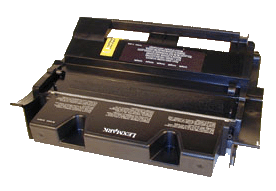*Lexmark T-630 Toner Cartridges
DOC-0324
First introduced in June 2001, the Lexmark T630 series
is based on the Lexmark T630 1200 dpi engine. Depending on the model, the
print speed is from 30-45 pages per minute. As with all of Lexmark’s new heavy
duty machines these machines are loosely based on the older Optra S machines
but these are much faster. Due to the speed and fuser characteristics, the
toner is completely different. This toner is also different from the T620
series.
The machines currently available based on the T630
engine are:
| T630 |
T630dn |
T630n |
| T630 |
T632dtn |
T632dtnf |
| T632n |
T634 |
T634dtn |
| T634dtnf |
T634n |
T634tn |
As with the T520/T620 machines, these cartridges have ARD (Anti-Recycling
devices) installed in the Prebate or “Return Program” cartridges that will not
allow the cartridge to be used again until the chip board is replaced. As with
other Lexmark cartridges, the Non-prebate or standard cartridges will work
with out replacing the chips. Lexmark seems to have abandoned the Prebate name
and gone with “Return Program” instead. Same mess, different name! The
programming used in these chips is similar to the code used in the new T420
series. Lexmark has added a few new wrinkles to the code that is making it a
little harder to develop a repair chip. It is currently being worked on and at
the time of this writing (May,2003), chips are not available. They should be
available as you read this. Check with your chip vendor to see if they are
available.
The Encoder wheel in these cartridges does not
indicate the toner yield as in the Optra S cartridges, that is now done by the
chip. The encoder wheel only indicates if the cartridge is a Prebate or not.
For cartridges used in MICR only machines, make sure
that the chip you are using is a dedicated MICR chip. This is also strictly a
chip function. If the cartridge is to be used in other than a Lexmark machine
the chip is different again. So far IBM, Dell, and Toshiba have not released
any machines using this engine, but they probably will. As the chip will again
be different, check with your chip supplier to make sure that their chip will
work with your machine.
All that being said, these cartridges have a huge
profit potential (See below). Even with the extra cost of the chip, and having
to be careful what machine it goes into, they are more than worthwhile to do.
The Lexmark Part #'s for these cartridges are as
follows:
|
“Return Program” 5K* cartridge: 12A7460 list $99.00** |
|
“Return Program” 21K* cartridge: 12A7462, List
$330.00** |
|
“Return Program” 32K* cartridge:
12A7465, List $355.00** |
|
Standard 5K* cartridge: 12A7360
list $149.00** |
|
Standard 21K* cartridge: 12A7362, List $380.00**
|
|
Standard 32K* cartridge: 12A7365, List $405.00** |
* Yield based on 5% coverage
** List prices current as of May 27th 2003
There are also two label cartridges, the 12A7468, and
the 12A7469.
Lexmark only lists the extra high yield cartridges
(32K) for the T632 and the T634 series. The lower yield cartridges will give
an unsupported cartridge error. The same will happen if the extra high yield
cartridge is installed in the T630 machines.
The T63x series of cartridges are different physically
from the T620 in that they have two large notches in the front edge of the
waste chamber. Since all of the cartridges from the Optra S on are somewhat
similar, we are showing all the different cartridge versions here. See
Figure’s 1-6
|

FIGURE 1
|
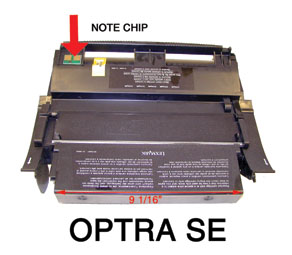
FIGURE 2
|
|
|
|

FIGURE 3 |
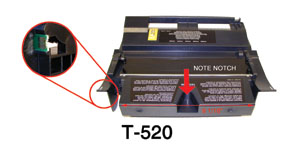
FIGURE 4
|

FIGURE 5 |
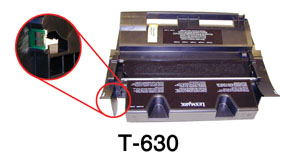
FIGURE 6 |
As with the Optra S machines, the Primary Charge Roller (PCR) is not in the
cartridge, it's in the printer, and is rated for 300,000 pages. The Wiper
Blade inside the cartridge has an external felt brush that keeps the PCR
clean. Some of the starter cartridges have wiper blades without this felt. It
is very important that the blade be replaced with a new one that has the felt.
Otherwise a buildup on the PCR may occur.
It should also be noted that because of the play
between the toner hopper and the OPC drum, a shipping lock should be installed
in every cartridge. This holds true even if you are going to hand deliver the
cartridge. This holds true for all the cartridges based on the Optra S design.
Machine Cartridge/troubleshooting as well as how to
run test prints will be covered at the end of this article.
-
T-630 Toner: Use 188g for the 5K cartridge, 780g for
the 21K cartridge, and 1200g for the 32K cartridge
-
Drum padding powder (Kynar) Do NOT use Zinc Sterate
on these cartridges!
-
Cotton Swabs
-
Isopropyl Alcohol
-
Cotton Pads
-
Long life OPC Drum (Optional)(4059 Style)
-
Wiper Blade (4059 Style with PCR cleaner!)
-
Shipping Lock
-
Felt Wand (4059 Style)
-
Recovery Blade (4059 Style)
-
Retaining Blades
-
Vacuum the exterior of the toner cartridge. Be
careful of the drum!
-
Place the cartridge on the bench drum side up (Label
face down), with the toner supply towards you.
-
With a spring hook, remove the two springs from each
end of the cartridge. See Figure 7
-
There are two plastic posts from the hopper that fit
into the cartridge shell. Pull the edge of the shell out to release the
posts, and lift up the hopper so that the posts are free. See Figure 8
-
Slide the hopper to the right, and remove from the
cartridge. Pull it out so that the large white bearing comes free. Place the
hopper aside. See Figure 9
-
Remove E-Ring from the small white helical gear end
of the drum axle. There is no need to remove the opposite E-ring. See Figure
10

FIGURE 7 |
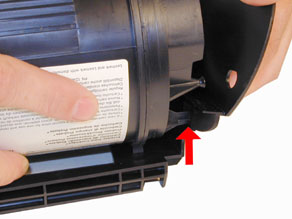
FIGURE 8 |
| |
|
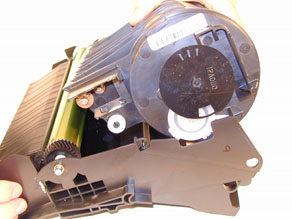
FIGURE 9 |
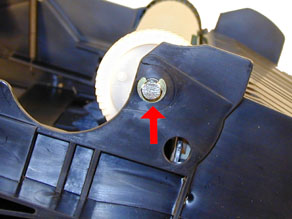
FIGURE 10 |
-
Slide the Drum Axle out of the cartridge. Hold the
small helical gear while pulling it out so that the drum is not damaged in
the process. Note the location of the small spring. See Figure’s 11 & 12
-
Gently lift the Drum up and out of the cartridge,
if you are going to reuse the drum, place it in a light protected area. Be
careful not to lose the spring, its’ purpose is to keep the drum from
rotating backwards. See Figure 13
-
Remove the Wiper Blade by removing the two screws
on either end of the Wiper Blade. See Figure 14
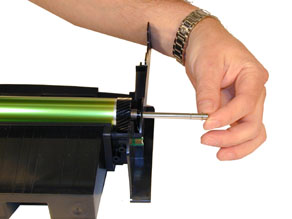
FIGURE 11 |

FIGURE 12 |
| |
|
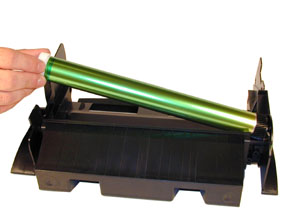
FIGURE 13 |

FIGURE 14 |
-
Place the cartridge so that the waste bin is
face-up. Take a razor blade and cut the foam seal that runs along the back
edge of the wiper blade to separate it from the cartridge. Make sure to
cut along the plastic/foam, and not the blade. See Figure 15
-
Hold the cartridge so that it is up-right
(Standing up with the waste bin on the table). With one hand, hold the
laser shutter open, and with the other hand, remove the Wiper Blade. See
Figure 16
NOTE1: The OEM Wiper Blade has the PCR
cleaning assembly attached to it. It cannot be removed from the Blade
without damaging it. Our new replacement Wiper Blades come complete with
this assembly attached. The "Starter cartridges" that came with a new
printer do not have the PCR Cleaning Assembly on the Wiper Blade. The
blades on the starter cartridges must be replaced.
-
Make sure that the two end foams are clean and in
their proper place See Figure 17
-
Pad the new Wiper Blade with Kynar padding powder,
replace the blade and two screws into the cartridge. (Don’t use Zinc
Sterate on these cartridges! See Figure 18
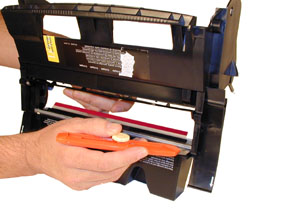
FIGURE 15 |

FIGURE 16 |
| |
|

FIGURE 17 |
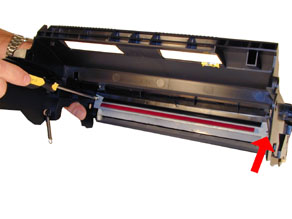
FIGURE 18 |
-
Place a piece of clear tape along the edge of the
Wiper Blade. If the tape does not stick well, the area should be cleaned
with alcohol. It is very important to get a good seal with the tape,
otherwise the cartridge will leak. Trim away any excess tape. See Figure
19
-
Be careful not to allow any tape into the laser
port opening!
-
With a pair of needle nose pliers, gently pry off
the Encoder Wheel. Make sure you pry it off from the center shaft so that
the wheel does not become damaged. Place the wheel in a safe place.
Remember, this wheel tells the cartridge what type of cartridge it is,
Prebate or Non-Prebate. The chip is what tells the machine what type of
yield the cartridge has. If this wheel becomes damaged, it must be
replaced. See Figure 20
-
Remove the drive gear from the developer roller
shaft. See Figure 21
-
Remove the Doctor Blade Spring by pressing down on
the center of the spring. See Figure 22

FIGURE 19 |
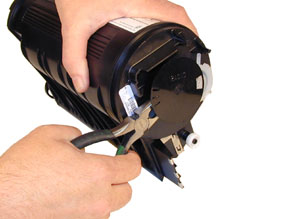
FIGURE 20 |
| |
|

FIGURE 21 |

FIGURE 22 |
-
Remove the metal contact plate from under the
developer roller shaft and bushing. See Figure 23
-
On the left (fill Plug) side of the Static Roller
there is a small metal bushing, take a small screwdriver, and pry the
bushing up so that the tab on the bushing is facing up. This will release
the bushing, and Developer Roller. See Figure 24
-
Remove the Developer Roller. Note that the spacers
are now clear instead of white. See Figures’ 25 & 26

FIGURE 23 |
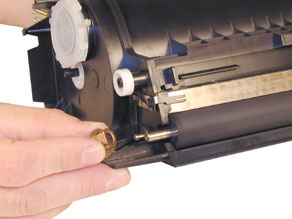
FIGURE 24 |
| |
|
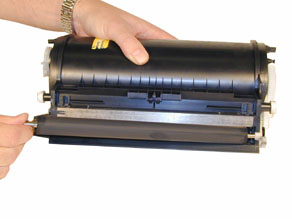
FIGURE 25 |

FIGURE 26 |
NOTE: Always remove the Doctor Blade Spring
before removing the Developer Roller, failure to do this will cause the
Doctor Blade to slide down from its original position and break the seal.
-
Remove the fill plug from the hopper. Pry the plug
out from the base next to the hopper. The fill plug is also a breather
cap. It is best to remove both sections at once and to clean them from the
outside. These plugs tend to leak if they have been separated. See Figure
27
-
Vacuum the Toner Hopper clean.
-
With a cotton swab dipped in alcohol, clean the
Developer Roller seals located on either end of the static roller section.
These seals are made of a white plastic. Also clean the electrical contact
that touches the Developer Roller shaft. See Figure 28
-
Carefully vacuum or blow off the Developer Roller,
Be careful not to touch the roller with your hands, or to damage this
roller in any way.
-
Inspect the inner and outer retaining blades
(Black Mylar). If they are bent in any way, they must be replaced as they
will leak. See Figure 29
-
Install the
contact plate onto the cartridge. See Figure 30
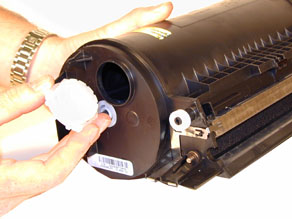
FIGURE 27 |
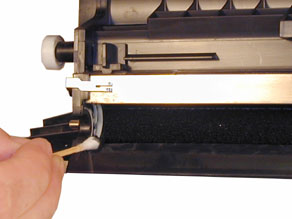
FIGURE 28 |
| |
|
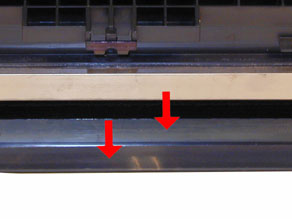
FIGURE 29 |
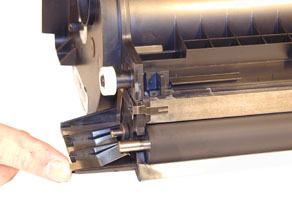
FIGURE 30 |
-
Place the keyed end of the Static Roller into the
cartridge, and install the roller. See Figure 31
-
Install the bushing onto the developer roller
shaft, turning it so that the tab is facing down. This will lock the
roller in place. See Figure 32
-
Install the Doctor Blade Spring. See Figure 33
-
Fill the hopper with the appropriate amount of
toner. Remember, the amount of toner that can be placed in the cartridge
is controlled by the chip. Use 870G for the 30k cartridge, and 290g for
the 10k cartridge. Install the Fill Plug. See Figure 34
-
Install the Encoder Wheel
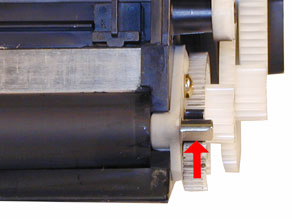
FIGURE 31 |
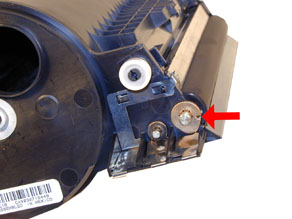
FIGURE 32 |
| |
|
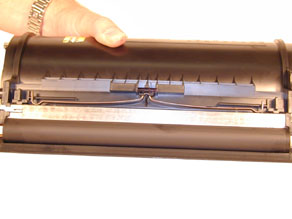
FIGURE 33 |
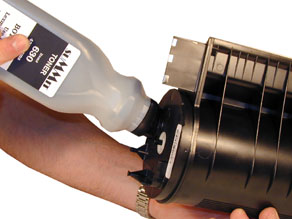
FIGURE 34 |
-
Take the OPC drum and lightly coat with the Drum
Padding Powder,(Kynar). Do NOT use DPP (Zinc Sterate), this powder will
ruin the wiper blade.
-
Place the OPC Drum into the cartridge with the
small helical gear on the NON-Contact side of the cartridge. Make sure
that the spring is in the proper position! See Figure 35
-
Install the Drum Axle pin into the small white
gear side of the drum.
-
The Axle must be installed this way to prevent the
axle from bending and damaging the drum ground contact located inside the
drum. See Figure 36
-
Install the E-Ring on the end of the axle. See
Figure 37
-
Remove the old chip with a pair of pliers, and
install the new chip. The chip will just pull out, and slide back in.
There are a few different physical versions of the aftermarket chips.
Check with your supplier for the correct instillation. See Figure 38
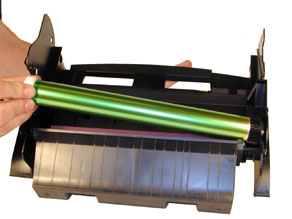
FIGURE 35 |
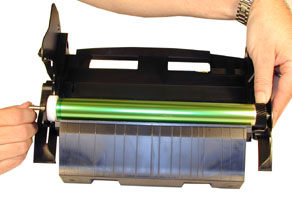
FIGURE 36 |
|
|

FIGURE 37 |
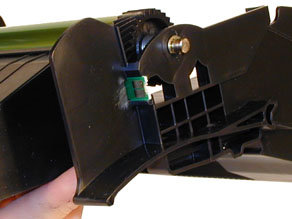
FIGURE 38 |
-
Take the Toner Hopper and install it left side
first. Make sure that the left side post, and the white bearing are in their
proper slot. See Figure 39
-
On the right side of the cartridge, pull the
cartridge shell out so that the right side post falls into its slot. See
Figure 40
-
With the spring hook, replace both springs on to the
Toner Supply Chamber. See Figure 41
-
Re-install the Developer Roller drive gear. See
Figure 42
-
A shipping lock must now be installed. This lock
should be used even if you are going to hand deliver the cartridge. It will
prevent the toner hopper from coming in contact with the OPC Drum, and
causing damage to either the Drum or the Developer Roller. Press the two red
tabs into the sides of the cartridge as indicated in the picture supplied
with the lock. See Figure 43
-
Although the only cartridges that come with the felt
wands are the label type, we still feel that they should be included, and
changed each cartridge. After running life tests on OEM cartridges in new
machines, we have seen some dirty looking upper fuser rollers.
-
Replace the felt wand in the machine by lifting up
the external plastic cover located over the fuser assembly. This is the same
place that all the Optra S based machines use.

FIGURE 39 |

FIGURE 40 |
|
|
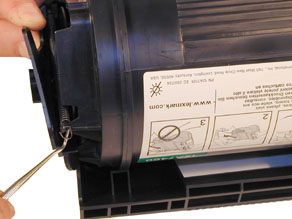
FIGURE 41 |

FIGURE 42 |
|
|

FIGURE 43 |
|
Dirty Primary Charge roller: Located inside
the PRINTER, this will show on the test page as vertical gray streaks down
the page, or as a gray background throughout the page.
Scratched drum: this is shown by a very thin,
perfectly straight line that runs from the top to the bottom of the test
page.
Chipped drum: This will show as a dot or
series of dots that repeat 2 times per page. Any drum defects will repeat 3
times per page based on the drum circumference of 5.2".
Light damaged drum: This will show up as a
shaded area on the test print that should be white. Again this will repeat 3
times per page.
Bad wiper blade: This will show as either a
gray line approximately 1/8" thick, or as shading across the entire page. In
either case there will be a film of toner on the drum surface.
Weak Dr. Blade Spring: This will usually show
as shaded areas on one or both sides of the page.
| Machine Error Codes: |
| 32 |
Unsupported Print cartridge: (Wrong chip, encoder wheel combination, or
bad chip). If this happens immediately upon cartridge instillation,
there is either a bad contact to the chip, or the chip is bad. If the
machine cycles and then the message appears, the wrong encoder wheel is
installed. In the T632 machines, this message will also show if the extra
high yield cartridge is not installed. |
| 80 |
Scheduled maintenance (300,000 page) |
| 88 |
Toner Low |
| 200-280 |
Various paper jams |
Printer menu:
Press the “MENU” key until
“Utilities Menu” is displayed
Press “SELECT”
Press the “MENU” key until “Print Menu” is displayed
Press “SELECT” w:
Font Sample:
Press the “MENU” key until
“Utilities Menu” is displayed
Press “SELECT”
Press the “MENU” key until “Print Fonts” is displayed
Press “SELECT”
Select either the PCL fonts or the Postscript fonts,
Press “SELECT”
The Print Menu page contains
the printer page count, toner level, cartridge serial number, cartridge size,
if it is Prebate or not, and the cartridge type, (Normal, MICR, Label).
Press the “MENU” key until
“Quality Menu” is displayed
Press “SELECT”
Press the “MENU” key until
“Toner darkness” is displayed
Press “SELECT”
Choose a number between 1
and 10. “8” is the default setting
Press the “MENU” key until
“Quality Menu” is displayed
Press “SELECT”
Press the “MENU” key until
“Print Resolution” is displayed
Press “SELECT”
The options available are
300, 600, 1200 Image Q, and 1200 Dpi. The 1200 Image Q is for bitmapped
pictures. The printer default is 600 Dpi.
© 2003 Summit Laser Products, Inc. Any attempt to reproduce any part of
these instructions without the written consent of Summit Laser Products, Inc is
prohibited. All registered trademarks are the property of their respective
owners.

Contact Summit Laser Products
Toll Free Orders:
800-221-3516
Toll Free Fax: 888-791-9188
International Orders:
+1-631-218-8376
International Fax: +1-631-218-3285
Domestic Sales E-mail: sales@summitlaser.com
International Sales E-mail: export@summitlaser.com
Technical Support:
+1-631-218-8376
Technical Support E-Mail: tech@summitlaser.com
Mail: Summit
Laser Products
95 Orville Drive, Bohemia, New York 11716 - USA
Please report any broken links to:
webmaster@summitlaser.com
Authorized Summit Laser Distributors
All products on this web site, unless stated otherwise, are independently produced and distributed by Summit Laser, and not by the individual manufacturers of the copiers and printers referenced herein. Use of trade styles and trademarks of the individual manufacturers of the copiers and printers referenced herein are for descriptive purposes only and are not intended to imply any form of endorsement by the individual manufacturers of the refill or supply products offered herein. As such, all items in this catalog are deemed to be construed as “for use in,” “for use with or compatible with,” whether or not stated for each individual item as opposed to the group of items.
|



